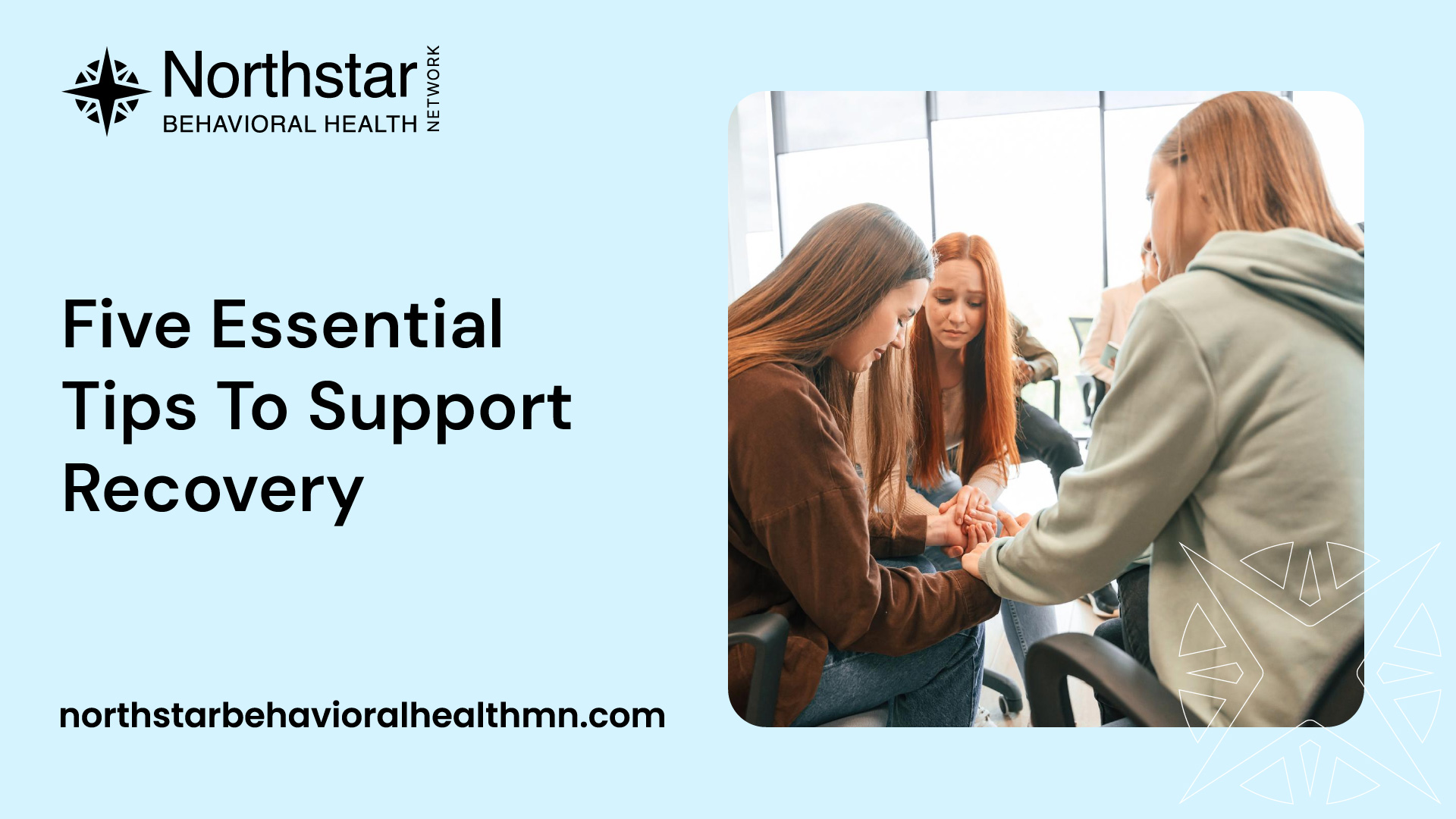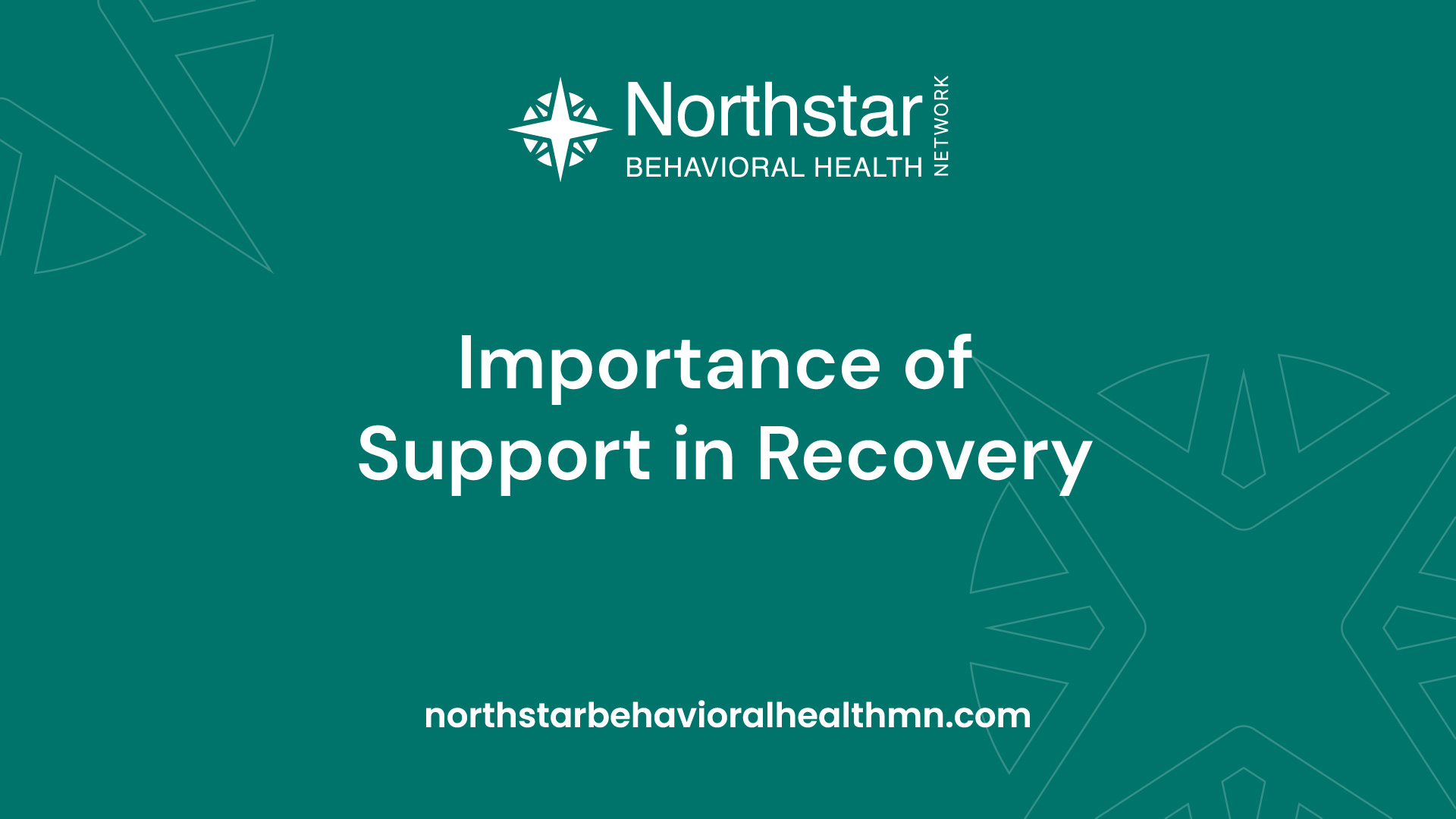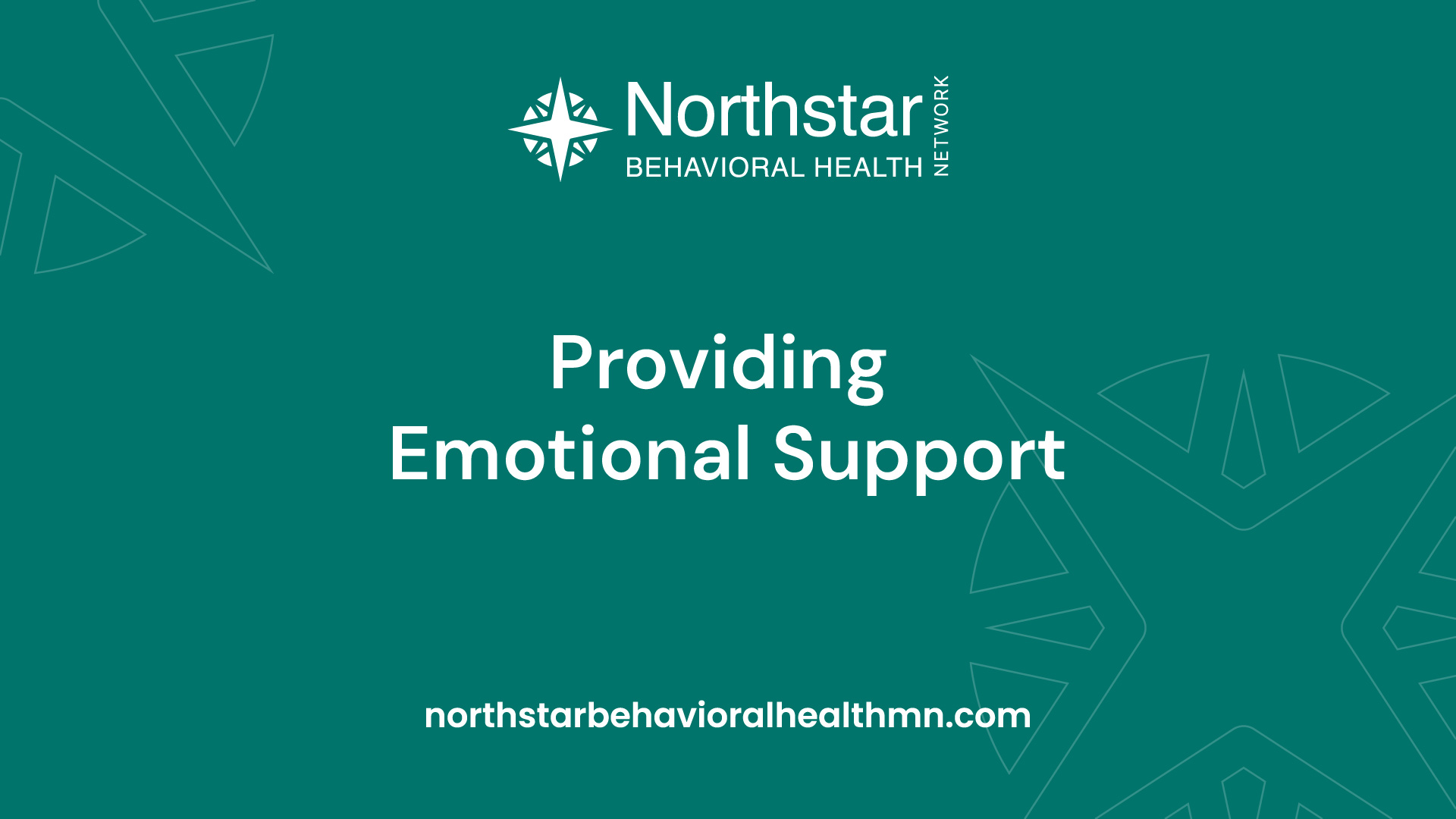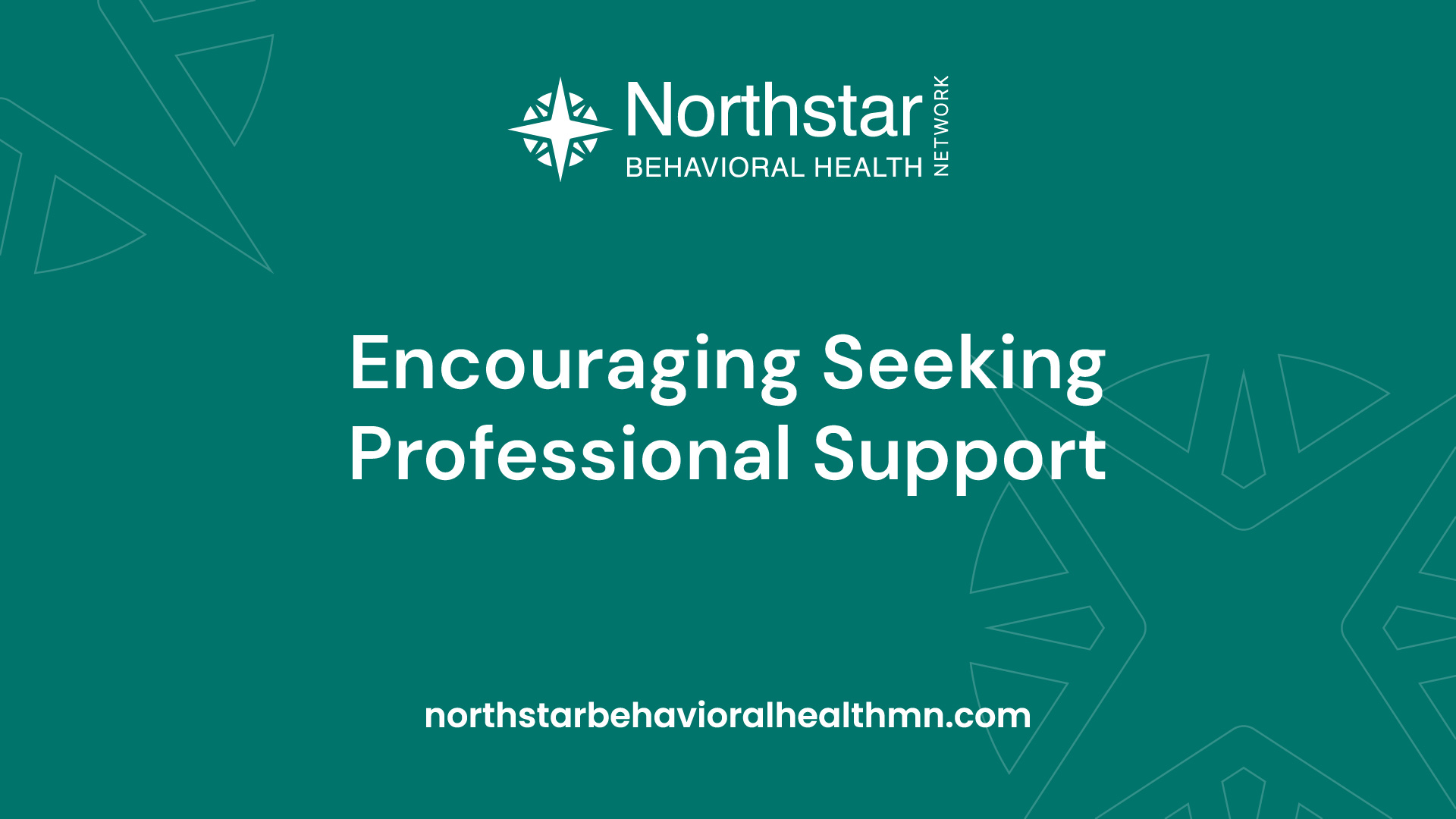August 27, 2024
Five Essential Tips To Support Recovery
Empower your loved one in recovery with these essential tips!


Understanding Recovery Support
Support plays a crucial role in the recovery journey of individuals who are seeking to overcome addiction. Loved ones can provide invaluable assistance and encouragement during this challenging time. In this section, we will explore the importance of support in recovery and discuss ways in which loved ones can help.
Importance of Support in Recovery

Having a strong support system is vital for individuals in recovery. Supportive loved ones can provide emotional stability, motivation, and a sense of belonging, all of which contribute to a successful recovery process. Here are some key reasons why support is essential:
- Emotional Well-being: Recovery is an emotional rollercoaster, and having someone to lean on can provide comfort and reassurance. Emotional support from loved ones helps individuals navigate through the ups and downs of the recovery journey.
- Accountability: Supportive loved ones can hold individuals accountable for their actions and choices. This accountability can help individuals stay focused on their recovery goals and avoid potential triggers or relapse.
- Motivation and Encouragement: Recovering from addiction can be challenging, and having loved ones who believe in the individual's ability to overcome obstacles can be a powerful motivator. Encouragement and positive reinforcement can boost confidence and determination.
- Reduced Isolation: Addiction often leads to feelings of isolation and alienation. Supportive loved ones provide a sense of belonging and connection, combating these feelings of isolation and promoting social reintegration.
Ways Loved Ones Can Help
Loved ones can play an instrumental role in supporting individuals in recovery. Here are some practical ways that loved ones can help:
- Educate Yourself: Take the time to learn about addiction, recovery, and the challenges individuals may face. This knowledge will enable you to better understand the recovery process and provide informed support.
- Be a Good Listener: Create a safe and non-judgmental space for open communication. Listen attentively to your loved one's experiences, concerns, and triumphs. Offering a listening ear can provide immense comfort and validation.
- Offer Practical Assistance: Help your loved one in practical ways, such as accompanying them to support group meetings, assisting with transportation to treatment appointments, or helping them find resources for their recovery journey.
- Encourage Healthy Habits: Support your loved one in adopting and maintaining healthy habits. Encourage regular exercise, nutritious eating, and sufficient sleep. These positive lifestyle changes can contribute to overall well-being and aid in the recovery process.
- Practice Self-Care: Taking care of your own well-being is essential when supporting someone in recovery. Ensure that you are setting healthy boundaries, seeking support for yourself if needed, and practicing self-care to maintain your own emotional and mental well-being.
Remember, recovery is a journey, and support from loved ones can make a significant difference in the lives of individuals seeking to overcome addiction. By offering understanding, encouragement, and practical assistance, you can empower your loved one on their path to recovery.
Establishing Trust and Communication
Supporting a loved one in recovery requires a foundation built on trust and open communication. By establishing trust and fostering effective channels of communication, you can create an environment that encourages honesty, understanding, and support.
Building Trust
Building trust is a vital component of supporting someone in their recovery journey. Trust is earned over time through consistent actions and behaviors. Here are some tips to help build trust:
- Be reliable: Show up when you say you will and follow through on your commitments. This demonstrates your commitment to their well-being.
- Maintain confidentiality: Respect their privacy and keep their personal information confidential. This includes their struggles, progress, and any challenges they may face.
- Avoid judgment: Be non-judgmental and refrain from criticizing or blaming them for their past actions. Instead, focus on their efforts and progress towards recovery.
- Be patient: Recovery is a process, and setbacks may occur. Patience is key as they navigate their journey, and offering support during challenging times can strengthen trust.
Open Communication Channels
Open and honest communication is essential for both parties involved. Here are some strategies to foster open communication:
- Create a safe space: Ensure they feel comfortable expressing their thoughts and emotions without fear of judgment. Encourage them to share their experiences and concerns openly.
- Listen actively: Practice active listening by giving your full attention, maintaining eye contact, and showing empathy. Avoid interrupting or offering advice unless asked for.
- Use "I" statements: When discussing sensitive topics, use "I" statements to express your feelings and thoughts without sounding accusatory. For example, say "I feel concerned when…" instead of "You always…"
- Encourage dialogue: Initiate conversations about their progress, challenges, and goals. Ask open-ended questions to encourage them to share their thoughts and feelings.
- Practice empathy: Put yourself in their shoes and try to understand their perspective. Be understanding and supportive, even if you may not fully comprehend their struggles.
By building trust and maintaining open lines of communication, you can provide a supportive environment that empowers your loved one in their recovery journey. Remember, each person's recovery process is unique, so it's important to adapt your approach based on their needs and preferences.
Providing Emotional Support

Emotional support plays a vital role in supporting a loved one's recovery journey. It's important to be there for them, offering encouragement and being a listening ear when they need it the most. Here are two essential ways you can provide emotional support.
Offering Encouragement
One of the most powerful ways to support your loved one in recovery is by offering encouragement. Let them know that you believe in their ability to overcome their challenges and that you are there to support them every step of the way. Encouragement can come in many forms, such as:
- Praising their progress: Acknowledge and celebrate their achievements, no matter how small they may seem. This can boost their confidence and motivation to continue on their recovery journey.
- Reminding them of their strengths: Help your loved one recognize their strengths and remind them of their past successes. This can provide them with a sense of empowerment and remind them of their ability to overcome challenges.
- Providing positive affirmations: Offer words of affirmation and reassurance. Let them know that they are strong, resilient, and capable of achieving their goals. Positive affirmations can help them stay focused and motivated during difficult times.
By offering encouragement, you can help your loved one maintain a positive mindset and build their self-esteem, which are crucial elements in the recovery process.
Being a Listening Ear
In addition to offering encouragement, being a listening ear is essential for providing emotional support. Many individuals in recovery may experience a range of emotions, and having someone who will listen without judgment can make a significant difference. Here are some tips for being an effective listener:
- Create a safe space: Ensure that your loved one feels comfortable opening up to you. Create an environment free of judgment and criticism, where they can freely express their thoughts and feelings.
- Practice active listening: Pay attention to what your loved one is saying and show genuine interest. Maintain eye contact, nod to show understanding, and ask open-ended questions to encourage further discussion.
- Validate their emotions: Let your loved one know that their feelings are valid and that you understand what they are going through. Avoid downplaying or dismissing their emotions, as this can undermine their trust and hinder open communication.
- Avoid offering unsolicited advice: Instead of jumping in with advice, focus on empathizing and understanding their perspective. Sometimes, all they need is someone to listen and validate their experiences.
By being a listening ear, you can provide your loved one with a sense of support and understanding. This can help them process their emotions, cope with challenges, and feel less alone on their journey to recovery.
Remember, emotional support is an ongoing process. Be patient, compassionate, and consistent in your efforts to provide encouragement and listen to your loved one. By doing so, you can play a crucial role in their recovery journey.
Encouraging Healthy Habits
Supporting your loved one in recovery involves not only emotional support but also encouraging healthy habits that can contribute to their overall well-being. By promoting self-care and encouraging positive lifestyle changes, you can play a crucial role in their journey towards recovery.
Promoting Self-Care
Self-care is an essential aspect of recovery, as it helps individuals prioritize their physical and mental well-being. Here are some ways you can encourage self-care:
- Encourage relaxation techniques: Suggest practices such as deep breathing exercises, meditation, or yoga to help your loved one manage stress and promote a sense of calm.
- Support healthy sleep habits: Adequate sleep is crucial for recovery. Encourage your loved one to establish a regular sleep schedule and create a relaxing bedtime routine.
- Promote a balanced diet: A nutritious diet can contribute to overall well-being. Encourage your loved one to eat a variety of fruits, vegetables, whole grains, and lean proteins. Avoid discussing any specific diets or weight loss plans, as these may not align with their recovery goals.
- Encourage physical activity: Regular exercise can boost mood, reduce stress, and improve overall health. Encourage your loved one to engage in activities they enjoy, such as walking, dancing, or swimming. However, it's important to respect their energy levels and physical limitations.
Encouraging Positive Lifestyle Changes
Recovery often involves making positive changes to one's lifestyle. Here are some ways you can support your loved one in making these changes:
- Be a role model: Lead by example and practice healthy habits yourself. This can inspire your loved one to follow suit and make positive changes in their own life.
- Assist with goal setting: Help your loved one set realistic and achievable goals related to their recovery. These goals could include finding new hobbies, pursuing education or career goals, or developing healthier relationships.
- Provide a supportive environment: Create a supportive and nurturing environment that encourages positive changes. This may involve removing triggers or negative influences from their surroundings and promoting a positive and uplifting atmosphere.
- Celebrate milestones: Acknowledge and celebrate your loved one's achievements along their recovery journey. Whether it's a month of sobriety or completing a milestone in their treatment program, recognizing their progress can be incredibly motivating.
By prioritizing self-care and encouraging positive lifestyle changes, you can empower your loved one in their recovery journey. Remember to be patient and understanding, as everyone's recovery process is unique. For more information on supporting your loved one in recovery, check out our article on how to help an addicted parent.
Setting Boundaries and Limits
Supporting a loved one in recovery involves establishing boundaries and understanding limits. This section will explore the importance of setting boundaries and how to establish them effectively.
Establishing Boundaries
When supporting someone in recovery, it's essential to establish clear boundaries. Boundaries help create a safe and healthy environment for both the individual in recovery and their loved ones. Here are some key points to consider when setting boundaries:
- Define expectations: Clearly communicate your expectations and limits regarding behavior, communication, and interactions. This helps establish a framework for healthy relationships and ensures that both parties understand what is acceptable and what is not.
- Be consistent: Consistency is crucial when it comes to boundaries. Stick to the established boundaries and avoid making exceptions. This consistency helps build trust and reinforces the importance of the boundaries set.
- Respect their autonomy: While it's important to set boundaries, it's equally important to respect the individual's autonomy. Allow them to make their own choices and take responsibility for their recovery journey. Avoid being overbearing or controlling, as this can hinder their progress.
- Revisit and adjust: Boundaries may need to be revisited and adjusted over time. As the individual progresses in their recovery, their needs and circumstances may change. Regularly check in and discuss any necessary adjustments to ensure that the boundaries continue to support their well-being.
Understanding Limits
Understanding your own limits is just as important as setting boundaries. Here's what you need to consider:
- Self-care: Prioritize your own well-being and self-care. Supporting someone in recovery can be emotionally challenging, and it's important to recognize when you need to take care of yourself. Set limits on the time and energy you can dedicate to their recovery, ensuring that you don't neglect your own needs.
- Avoid enabling: It's crucial to understand the difference between supporting and enabling. Enabling behaviors can inadvertently hinder the individual's progress in recovery. Set limits on enabling behaviors, such as providing financial support without accountability or covering up their mistakes. For more information on enabling behaviors, check out our article on five ways you may be encouraging your loved one to use drugs or alcohol.
- Seek support: Remember that you don't have to navigate this journey alone. Seek support from professionals, support groups, or therapists who specialize in addiction and recovery. They can provide guidance and help you set appropriate limits for yourself and your loved one.
Understanding and respecting both your own and your loved one's limits is essential for maintaining a healthy balance during the recovery process. By setting boundaries and knowing your limits, you can create a supportive environment that promotes their recovery while taking care of yourself. For more resources on addiction and recovery, visit our article on how to help an addicted parent.
Seeking Professional Help When Needed
Supporting a loved one in recovery can be a challenging journey, and there may come a time when professional assistance is necessary. Recognizing the signs that indicate the need for professional help is crucial for the well-being and progress of your loved one. Here are some signs to look out for and ways to encourage seeking professional support.
Recognizing Signs for Professional Assistance
It's important to be vigilant and recognize signs that indicate the need for professional help. While every situation is unique, here are some common signs that may suggest the need for additional support:
- Intense Withdrawal Symptoms: If your loved one is experiencing severe withdrawal symptoms or struggling to manage the physical and emotional challenges of recovery, it may be time to seek professional assistance.
- Mental Health Issues: Co-occurring mental health issues, such as anxiety or depression, can complicate the recovery process. If your loved one is showing signs of significant distress or their mental health is deteriorating, professional help may be necessary.
- Relapse or Continued Substance Use: If your loved one has experienced a relapse or is unable to maintain sobriety despite their best efforts, it's crucial to seek professional support. Professionals can provide the necessary guidance and interventions to address the underlying issues.
- Lack of Progress or Stagnation: If your loved one's recovery progress has plateaued or they are struggling to make positive changes in their life, seeking professional assistance can provide the additional tools and resources needed to move forward.
Remember, these signs are not exhaustive, and each individual's journey is unique. Trust your instincts and consult with healthcare professionals or addiction specialists who can offer guidance tailored to your loved one's specific situation.
Encouraging Seeking Professional Support

Approaching the topic of seeking professional help can be sensitive, but it's essential to communicate your concerns and support your loved one in making this decision. Here are some tips for encouraging your loved one to seek professional support:
- Express your Concern: Start the conversation by expressing your genuine concern for their well-being and emphasize that seeking professional help is a proactive step towards their recovery.
- Provide Information: Share information about the benefits of professional support and the resources available. Highlight success stories and let them know that seeking help is a sign of strength, not weakness.
- Offer Assistance: Offer to help research and identify reputable professionals or treatment centers. Provide emotional support and reassurance throughout the process, and be prepared to accompany your loved one to appointments if they desire.
- Normalize Professional Help: Normalize the idea of seeking professional help by explaining that addiction recovery often requires a comprehensive approach that combines personal support with professional guidance. Emphasize that professionals have the expertise and experience to address specific challenges that may arise during the recovery journey.
Remember, it is ultimately your loved one's decision to seek professional help. Be patient, understanding, and non-judgmental throughout the process. Your unwavering support can make a significant difference in their willingness to seek the professional assistance they may need.
By recognizing the signs that indicate the need for professional help and encouraging your loved one to seek support, you can empower them on their recovery journey. Professional assistance can provide the specialized care and guidance necessary for long-term recovery success.

.jpg)




.jpg)

